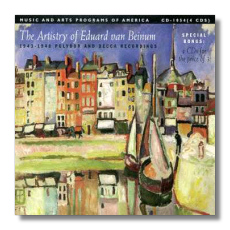
The Internet's Premier Classical Music Source
Related Links
- Latest Reviews
- More Reviews
-
By Composer
-
Collections
DVD & Blu-ray
Books
Concert Reviews
Articles/Interviews
Software
Audio
Search Amazon
Recommended Links
Site News
 CD Review
CD Review
The Artistry of Eduard Van Beinum

- Hector Berlioz: Symphonie fantastique
- Piotr Ilyitch Tchaikovsky: Serenade for Strings: Waltz
- Benjamin Britten: Peter Grimes: Four Sea Interludes and Passacaglia
- Anton Bruckner: Symphony #7
- Max Reger:
- Eine Ballett-Suite
- Variations and Fugue on a Theme by W.A. Mozart
- Wolfgang Mozart: Piano Concerto #24
- Igor Stravinsky: The Rite of Spring
- Béla Bartók: Concerto for Orchestra
Kathleen Long, piano
Concertgebouw Orchestra, Amsterdam/Eduard van Beinum
Music & Arts CD-1054 AAD monaural 4CDs: 72:31, 72:16, 67:48, 69:35
Conductor Eduard van Beinum (1901-1959) bridged the gap between the intense subjectivity of the Willem Mengelberg and the pluripotent professionalism of Bernard Haitink, who may be said to have initiated the Concertgebouw Orchestra's modern era. As such, van Beinum has neither the cult following of the former conductor nor the broad exposure, thanks to LPs and CDs, of the latter. Few of his recordings currently are available on CD. Nevertheless, he was a distinctive conductor and this new Music & Arts set leaves no doubt that he belongs in the pantheon of the 20th Century's great conductors.
Apparently van Beinum was modest – not a common trait in conductors! He described himself as "an intermediary between the listener and the composer," eschewed expressive distortions of the written score, and avoided taking a dictatorial air with orchestral musicians. His repertoire was broad; it began with the Baroque era and continued on to music of the present day. In his discography, one finds light classics holding the same prominence as heavy and philosophical masterpieces by Mahler and Bruckner. Had he lived longer into the stereo era (he died, like Mitropoulos, during a rehearsal), his work would be more familiar today.
Van Beinum made recordings for Decca, Telefunken, Polydor, and Philips. His relatively few stereo recordings were made for the latter label. The recordings in the present collection come from between 1943 and 1948, and were done for Decca and Polydor; of course all of them were originally released in the 78-rpm format. It is from 78-rpm discs that Music & Arts has built this set; the "technical reconstruction" is by Maggi Payne. Apparently little filtering or noise-reduction has been used, because the sound is affected to a greater or lesser degree by surface noise, perhaps more than some listeners will be willing to tolerate. (The noisiest of the lot is The Rite of Spring, a Decca recording from 1946.) I quickly forgot about it, however. The recordings are rather vivid, given their vintage, and the musicianship compensates for the less than ideal sound.
Although these performances are somewhat conservative, they are far from bland. The Berlioz (Decca, 1946) is shaped with loving care; van Beinum is sensitive to the score's every shifting mood, and yet the end result is not fussy. The Rite of Spring was recorded in the same month, also for Decca. Although it contains some striking faults in ensemble, it also is a high-voltage reading. The Peter Grimes interludes, recorded for Decca one year later, are strikingly atmospheric, and I challenge you to find a stormier "Storm." The Bruckner Seventh also was taped at this time, and its humanity and architectural strength are typical of van Beinum's Bruckner. The Mozart Piano Concerto and the Bartók Concerto for Orchestra were recorded in September 1948. I liked the conductor's dark-hued interpretation of the former; intensity is maintained throughout, but not at the expense of Mozartean style. The Bartók is a showpiece for the Concertbebouw Orchestra. Van Beinum was only the second conductor to record it (Fritz Reiner was the first), and his version is notable for its brisk tempos and flashes of humor. The two Reger works were recorded in May 1943 for Polydor, and van Beinum deserves recognition for the dedication he gives to music that does not travel well.
I appreciate the well-filled discs (and the four of them are selling for the price of three). One casualty is the Reger Ballet Suite, whose six movements are unfortunately split between Discs 2 and 3. The booklet note by Robert E. Benson is interesting. (See his van Beinum website at http://www.concentric.net/~Classcd/evb.html – it includes a discography of the conductor). Elsewhere, more proofreading was needed. For example, the third page of the booklet implies that only the first four movements of the Berlioz are included; actually, the work is given complete.
Copyright © 2000, Raymond Tuttle


















